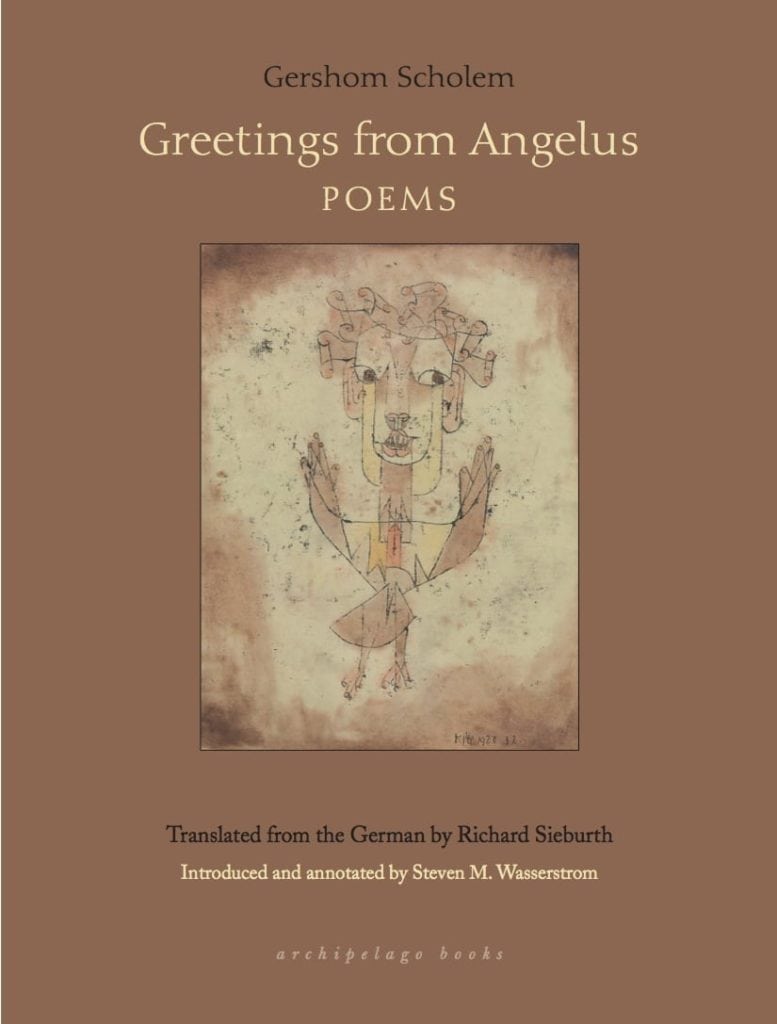Book Description
One of the twentieth century’s most maverick scholars of religion, Gershom Scholem introduced the study of Kabbalah and Jewish mysticism into the academy—and into modern Jewish literature, philosophy, and the arts as a whole. This annotated, bilingual volume contains the German poetry that he wrote for the most part in private or addressed to a few selected friends, such as Walter Benjamin. His verse registers his lifelong disappointment with the eventualities of Zion, caught as it is at every point in a fraught dialectic of messianic hope and despair.
Clearly among the great intellectual historians of the last century... Among those generally traditional in qualities, the best is Amtliches Lehrgedicht, which Richard Sieburth, a champion in this turf, translates as The Official Abcedarium. Neat, concise, and, zany to a degree typical of proto-Dada Berlin avant-garde writers, Amtliches Lehrgedicht was given to Benjamin... [and] belongs in the canonical anthologies of modern German poems.— Richard Kostelanetz, Rain Taxi
Greetings from Angelus offers an aspect of Scholem's own communing with the spirit of language that will be new even to those quite familiar with his works in philology and history of religion...the verses collected here were acts of private devotion.
— Erica X Eisen, Threepenny Review
Gershom Scholem's scholarship was of [the] rare, life-giving kind. Not only have his studies of the Kabbalah altered ... the image of Judaism--but his explorations, translations, and presentations of Kabbalistic writings exercise a formidable influence on literary theory at large, on the ways in which non-Jewish and wholly agnostic critics and scholars read poetry.
— George Steiner, The New Yorker
Scholem has rare gifts for synthesis and generalization, as several of his more recent essays on Jewish messianism and tradition demonstrate, but his mind is equally remarkable for the way it adheres to the smallest particles of particular historical experience.
— Robert Alter, "The Achievement of Gershom Scholem"
Scholem has the kind of ironic intelligence that delights in contradictions, that can hold the multiple attributes of the subjects it scrutinizes in clear simultaneous view, and that is even capable on occasion of a certain teaching archness, for all its scholarly gravity.
— Robert Alter, "The Achievement of Gershom Scholem"
Scholem's massive achievement can be judged as being unique in modern humanistic scholarship, for he has made himself indispensable to all rational students of his subject... Scholem's formidable achievement is as much rhetorical or figurative as it is historical... He has the same relation to the texts he has edited and written commentaries upon that a later poet like John Milton had to the earlier poems he absorbed and, in some ways, transcended. Scholem is a Miltonic figure in modern scholarship and deserves to be honored as such.
— Harold Bloom, Modern Critical Views: Gershom Scholem
Scholem's particular genius is that he did not stumble, but walked nimbly upon that rope, which he called neither religion nor nihilism.
— Harold Bloom, Modern Critical Views: Gershom Scholem
Gershom Scholem wrestled with the great questions of his time: the fate of utopian dreams in the pincers of 20th century history and the lingering, transcendent value of friendship, Richard Sieburth's luminous translations capture Scholem's voices as he dances back and forth across the border line between punditry and prophecy, while always projecting sheet passion for the Word.
— George Prochnik
... an airtight translation by Richard Sieburth... [Scholem's] insights offer captivating glances into one of the most exploratory, prophetic Jewish minds of the twentieth century.
— Elie Lichtschein, Jewish Book Council
Richard Sieburth’s deep understanding of Scholem’s thought, and his masterful re-creation of Scholem’s rhythms and rhymes, reflect the inner workings of these original German poems. Sieburth’s translations offer a fascinating insight into the thoughts and literary sensibility of one of the great minds of the twentieth century.
— Peter Constantine, World Literature Today
...Scholem’s most private writing... The poems collected in Greetings from Angelus were never intended to be published; at most they were written for an audience of one. Often this was Walter Benjamin...[I]n this crucial period of Scholem’s intellectual development, Benjamin was a key stimulus to his thinking about language, myth, and Judaism... [T]he most serious poems Scholem wrote concerned his spiritual disappointment in Zion, as in “Media in Vita,” a lament written in 1930: "I have lost the faith/ that brought me to this/ place./ And in the wake of this/ forsaking,/ night is my surrounding/ space..."
— Adam Kirsch, The New York Review of Books

